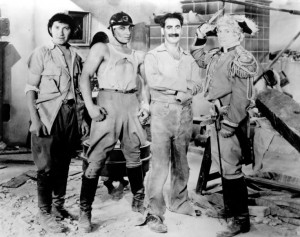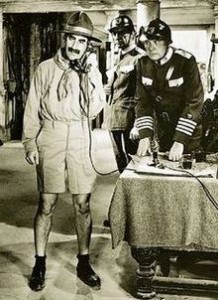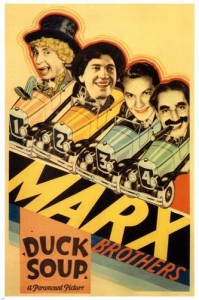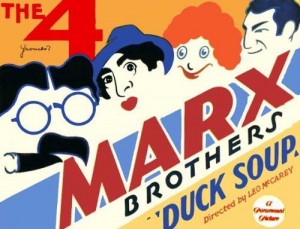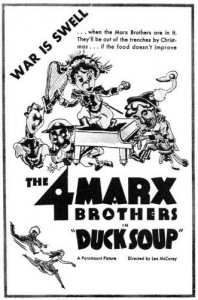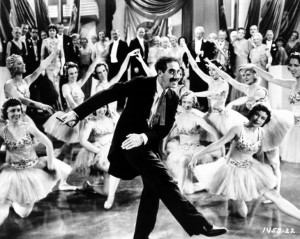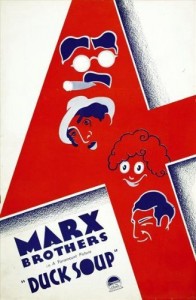Duck Soup ***** (1933, Marx Brothers) – Classic Movie Review 1405
‘I could dance with you ‘til the cows come home. On second thought, I’d rather dance with the cows ‘til you came home.’ Director Leo McCarey’s glorious vintage 1933 comedy delivers firecracker lunacy from the four Marx Brothers, mixing political satire on international diplomacy with absurdist backchat and dazzling slapstick routines.
With the crew at their peak, it’s perhaps the best and wittiest of all the Marx Brothers comedies thanks to the inspired verbal and sight gags galore and the satirical attacks on war, politics and patriotism. There may not be much of a plot but there are several classic sequences, including the immortal mirror routine, the soft-drinks stand scene and the battle climax.
Groucho Marx stars as Rufus T. Firefly, who becomes the leader of Freedonia, while Harpo Marx (as Pinky, a spy for Sylvania who never talks) and Chico Marx (as Chicolini, another spy for Sylvania, one who never stops talking) get involved in a bit of espionage as the Freedonians plunge into a war with the next-door country of Sylvania.
It is the last Marx Brothers film to feature Zeppo (playing Lt. Bob Roland, Firefly’s secretary) and the last of the five Marx Brothers classic movies released by Paramount, after bitter contract disputes, including a threatened walk-out by the Marxes, crippled relationships between them.
And the Marx Brothers enjoy magnificent support from a great team of comedy character actors. The cast includes magnificently the redoubtable Margaret Dumont as rich widow Mrs Gloria Teasdale, the perfect foil of so many of Groucho’s jokes (‘Remember, you’re fighting for this woman’s honour, which is probably more than she ever did’), and Louis Calhern as Ambassador Trentino of Sylvania, who schemes to have his country take over Freedonia.
With the emphasis all on freewheeling, anarchic laughs, interludes with Harpo and Chico’s usual musical solos are certainly not much missed, and neither Harpo’s harp nor Chico’s piano is used in the film.
Duck Soup is written by the smart, clever and witty Bert Kalmar and Harry Ruby, with additional dialogue by Arthur Sheekman and Nat Perrin, while Kalmar and Ruby also provide the strongly written songs that still come over loud and clear. The Freedonia National Anthem, consisting of ‘Hail, Hail, Freedonia, land of the brave and free’, is used frequently both as vocal and instrumental. The rival ‘Sylvania theme’, sounding vaguely like ‘Rule, Britannia!’ is also used several times.
It’s so enduringly, hysterically funny that it comes as a shock that it was a critical and box-office disappointment, not doing as well as Horse Feathers, though still the sixth-highest grossing film of 1933. Critics felt it did not meet the standards of its predecessors, but now it is widely considered the Marx Brothers’ finest film and a masterpiece.
The Marx Brothers were ecstatic when Benito Mussolini took the film as a personal insult and banned it in Italy. The residents of Fredonia, upstate New York, protested because they feared the film would hurt their town’s reputation. The Marx Brothers told them to change the name of their town to keep it from hurting their movie. The Marx Brothers chose to insult Fredonia because they had once played to a hostile crowd there on a theatre tour. So the film could have been called Chickens Coming Home to Roost.
I feel a need to explain the title but I can’t. The opening scene, showing ducks swimming in a kettle and quacking merrily, is the only one with anything remotely to do with ducks or soup. Director McCarey is said to have come up with the title, having used it for an earlier 1927 film with Laurel and Hardy. It was American slang at that time, meaning something easy to do. Groucho’s explanation of the title: ‘Take two turkeys, one goose, four cabbages, but no duck, and mix them together. After one taste, you’ll duck soup for the rest of your life.’
And now I need to end on a joke. Rufus T Firefly: ‘I suggest that we give him ten years in Levenworth, or eleven years in Twelveworth.’ Chicolini: “I’ll tell you what I’ll do. I’ll take five and ten in Woolworth.’
PS: In Woody Allen’s Hannah and Her Sisters (1986), a chance screening of Duck Soup convinces Allen’s character that life is still worth living and he abandons his idea of suicide.
(C) Derek Winnert 2014 Classic Movie Review 1405
Link to Derek Winnert’s home page for more film reviews: http://derekwinnert.com/


